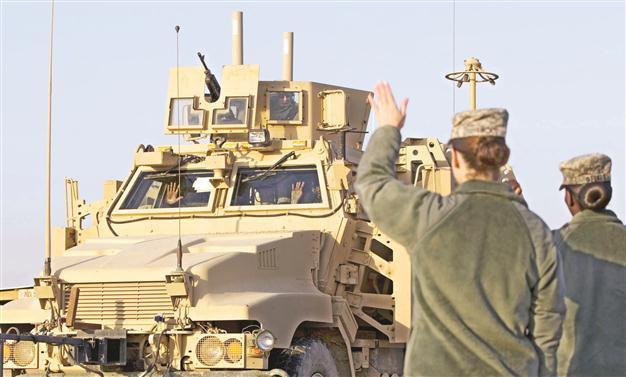Iraqi politics crack as last US troops withdraw
BAGHDAD / RIYADH

US military officers welcome vehicles entering Kuwait during their withdrawal from Iraq yesterday, ending nearly nine years of war that cost thousands of lives. REUTERS photo
Iraqi Prime Minister Nouri al-Maliki called on lawmakers yesterday to force out one of his own deputies amid a political crisis that has deepened as U.S. forces completed their troop withdrawal.Al-Maliki’s push for the ouster of Saleh al-Mutlak, a Sunni Arab who described him on television as “worse than Saddam Hussein,” came a day after the deputy prime minister’s Iraqiya bloc said it was boycotting parliament in protest at the premier’s alleged centralization of power. The latest moves come with the U.S. military having completed its withdrawal from Iraq yesterday morning, nearly nine years after the 2003 invasion that ousted Saddam from power.
“The prime minister sent an official letter to parliament, asking it to withdraw its confidence in Saleh al-Mutlak after his recent statements,” Ali Mussawi, media advisor to al-Maliki, told Agence France-Presse. Al-Mutlak, who had been accused of being a supporter of Saddam’s outlawed Baath party in the run-up to March 2010 elections that he was barred from standing in, told CNN on Dec. 13 that Washington was leaving Iraq “with a dictator.”
Meanwhile, security officials said at least two guards of Vice President Tareq al-Hashemi, also a Sunni Arab and an Iraqiya member, were arrested in connection with a Nov. 28 attack on parliament. Local Iraqi news outlets reported that an arrest warrant had also been issued for al-Hashemi himself, but judicial and police officials declined to comment.
On Dec. 17, Iraqiya, which emerged as the largest bloc in March 2010 elections and has 82 lawmakers in the 325-seat parliament, issued a statement saying it was suspending its participation in parliament to protest what it said was al-Maliki’s centralization of decision-making.
“We can no longer remain silent about the way the state is being administered, as it is plunging the country into the unknown,” it said. Iraqiya, which garnered most of its support from Iraq’s Sunni Arab minority, was out-maneuvered for the premiership by al-Maliki, who, after finishing second in the elections, struck a deal with another grouping to broaden his power base and lead the government.
The bloc, which controls nine ministerial posts, has not pulled out of Iraq’s national unity government, however. Iraqiya said the government’s actions, which it claimed included stationing tanks and armored vehicles outside the houses of its leaders in the heavily-fortified Green Zone, “drives people to want to rid themselves of the strong arm of central power as far as the constitution allows them to.”
Gulf Arab states to meet over Iranian influence
Meanwhile, leaders of the Gulf Arab states are expected to meet at their annual summit today against a backdrop of accelerating regional turmoil and fears of growing Iranian influence after the U.S. pullout from Iraq. “Several regional issues impose themselves on the summit this year,” including relations with Iran, as well as the situation of Syria and Yemen, Omani Foreign Minister Yussef ben Alawi Abdullah said.
In the year since the six-nation Gulf Cooperation Council last met, popular revolutions have unseated entrenched dictators in Tunisia, Egypt and Libya, and are now threatening regime change in Syria, while in the neighboring Arab peninsula state of Yemen, the long-time president has been forced to hand over power.
Iran is widely believed to exert major influence on the Iraqi government, which is dominated by Shiites, and has been accused by Washington of training and equipping Shiite militias in the south of Iraq, charges Tehran denies. Saudi-Iranian relations have also rapidly deteriorated in recent months, as the Sunni kingdom continues to accuse its arch rival of stoking unrest among Saudi Shiites in the country’s Eastern province.
















